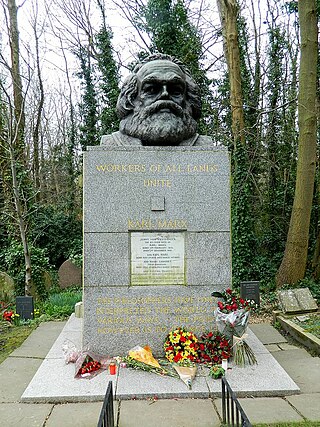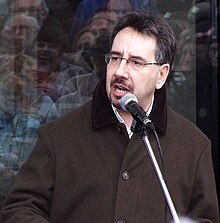
Leninism is a political ideology developed by Russian Marxist revolutionary Vladimir Lenin that proposes the establishment of the dictatorship of the proletariat led by a revolutionary vanguard party as the political prelude to the establishment of communism. Lenin's ideological contributions to the Marxist ideology relate to his theories on the party, imperialism, the state, and revolution. The function of the Leninist vanguard party is to provide the working classes with the political consciousness and revolutionary leadership necessary to depose capitalism.
Bolshevism is a revolutionary socialist current of Soviet Leninist and later Marxist–Leninist political thought and political regime associated with the formation of a rigidly centralized, cohesive and disciplined party of social revolution, focused on overthrowing the existing capitalist state system, seizing power and establishing the "dictatorship of the proletariat".

Alexander Theodore Callinicos is a Rhodesian-born British political theorist and activist. An adherent of Trotskyism, he is a member of the Central Committee of the Socialist Workers Party (SWP) and serves as its International Secretary. Between 2009 and 2020 he was the editor of International Socialism, the SWP's theoretical journal, and has published a number of books.
Duncan Hallas, was a prominent member of the Trotskyist movement and a leading member of the Socialist Workers Party in Great Britain.
The Respect Party was a left-wing to far-left socialist political party active in the United Kingdom between 2004 and 2016. At the height of its success in 2007, the party had one Member of Parliament (MP) in the House of Commons and nineteen councillors in local government.

Lindsey Ann German is a British left-wing political activist. A founding member and convenor of the British anti-war organisation Stop the War Coalition, she was formerly a member of the Socialist Workers Party, sitting on its central committee and being editor of its magazine, Socialist Review.

John Molyneux was a British Trotskyist, academic and author. He was a leading member of the Socialist Workers Party before retiring to Ireland, where he became active in the Irish SWP and was editor of Irish Marxist Review.
Colin Barker was a British sociologist as well as a Marxist historian and writer. A former long-standing member of the Socialist Workers Party in Manchester, he was the author of numerous articles and works on Marxism, including a history of the Polish trade union Solidarity, Festival of the Oppressed.
Counterfire is a Marxist and revolutionary socialist organisation in the United Kingdom. Founded in 2010, it runs a website and has published pamphlets under the Counterfire imprint. It has its origins in the Trotskyist political tradition.
The Left List, later renamed the Left Alternative, was a political party active in the United Kingdom between 2008 and 2010. A minor party, it never had any of its candidates elected at any level of UK government although it inherited several local councillors who had defected to it from the Respect Party.

Before the perestroika Soviet era reforms of Gorbachev that promoted a more liberal form of socialism, the formal ideology of the Communist Party of the Soviet Union (CPSU) was Marxism–Leninism, a form of socialism consisting of a centralised command economy with a vanguardist one-party state that aimed to realize the dictatorship of the proletariat. The Soviet Union's ideological commitment to achieving communism included the national communist development of socialism in one country and peaceful coexistence with capitalist countries while engaging in anti-imperialism to defend the international proletariat, combat the predominant prevailing global system of capitalism and promote the goals of Bolshevism. The state ideology of the Soviet Union—and thus Marxism–Leninism—derived and developed from the theories, policies, and political praxis of Marx, Engels, Lenin, and Stalin.
Dialectical and Historical Materialism, by Joseph Stalin, is a central text within the Soviet Union's political theory Marxism–Leninism.
Marxism is a method of socioeconomic analysis that originates in the works of 19th century German philosophers Karl Marx and Friedrich Engels. Marxism analyzes and critiques the development of class society and especially of capitalism as well as the role of class struggles in systemic, economic, social and political change. It frames capitalism through a paradigm of exploitation and analyzes class relations and social conflict using a materialist interpretation of historical development – materialist in the sense that the politics and ideas of an epoch are determined by the way in which material production is carried on.

Christopher John Harman was a British journalist and political activist, and a member of the Central Committee of the Socialist Workers Party. He was an editor of International Socialism and Socialist Worker.

The Socialist Workers Party (SWP) is a far-left political party in the United Kingdom. Founded as the Socialist Review Group by supporters of Tony Cliff in 1950, it became the International Socialists in 1962 and the SWP in 1977. The party considers itself to be Trotskyist. Cliff and his followers criticised the Soviet Union and its satellites, calling them state capitalist rather than socialist countries.

Michael Lavalette is a British academic specialising in social work. He was a member of the Socialist Workers Party (SWP) from 1981 until 2018, when he left to join Counterfire. He was a local councillor in Preston, Lancashire from 2003 to 2014.
Orthodox Marxism is the body of Marxist thought which emerged after the deaths of Karl Marx and Friedrich Engels in the late 19th century, expressed in its primary form by Karl Kautsky. Kautsky's views of Marxism dominated the European Marxist movement for two decades, and orthodox Marxism was the official philosophy of the majority of the socialist movement as represented in the Second International until the First World War in 1914, whose outbreak caused Kautsky's influence to wane and brought to prominence the orthodoxy of Vladimir Lenin. Orthodox Marxism aimed to simplify, codify and systematize Marxist method and theory by clarifying perceived ambiguities and contradictions in classical Marxism. It overlaps significantly with instrumental Marxism.

Far-left politics in the United Kingdom have existed since at least the 1840s, with the formation of various organisations following ideologies such as Marxism, revolutionary socialism, communism, anarchism and syndicalism.

The following outline is provided as an overview of and topical guide to Marxism:

Foundations of Leninism was a 1924 collection made by Joseph Stalin that consisted of nine lectures he delivered at Sverdlov University that year. It was published by the Soviet newspaper, Pravda.










